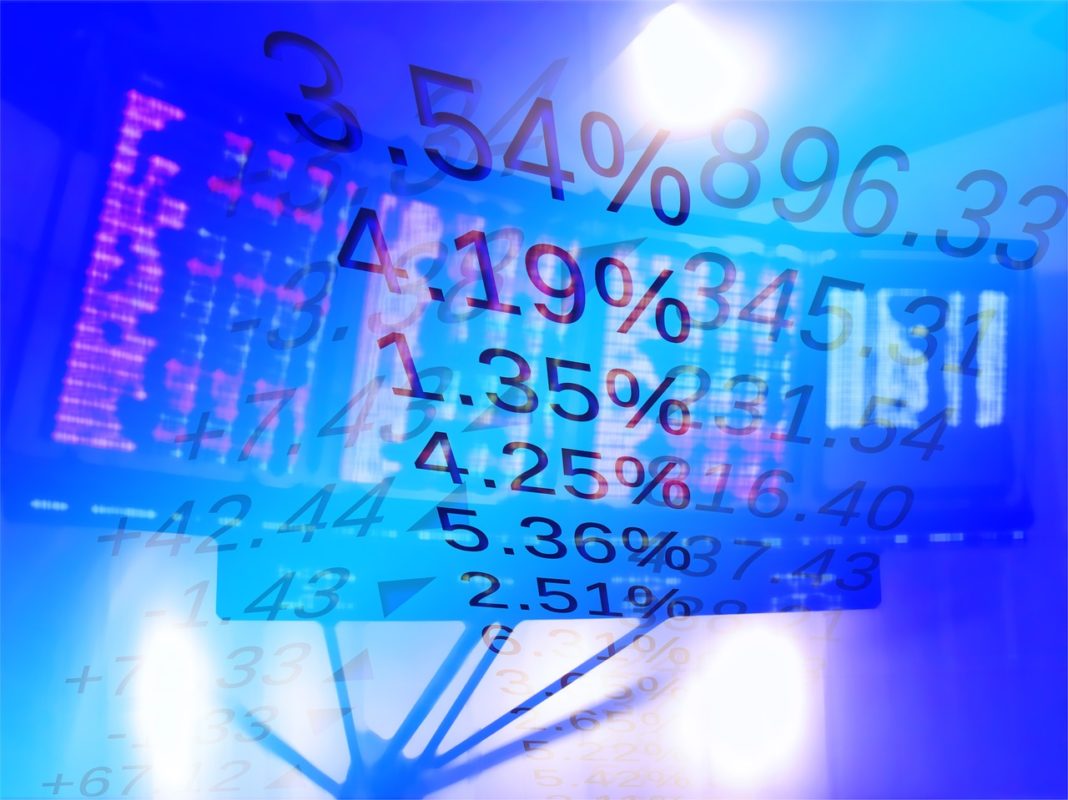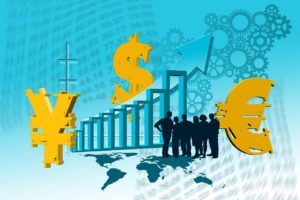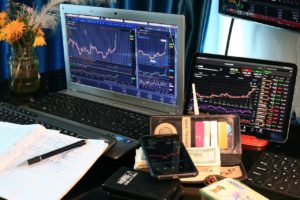Table of contents
For some years now, not only banks but also private traders and investors have had the opportunity to trade in foreign currencies (foreign exchange). More and more private customers in Germany want to participate in the so-called Forex trading, the trading with foreign currencies. Forex trading follows a simple principle. Nevertheless, it is important to understand the mechanism and also to know the technical terms.
For this reason, we would like to inform you in our article, among other things, about what Forex trading is about and what the most important terms are. We will also show you how you can alternatively trade Forex using CFDs.
What is Forex Trading?
The abbreviation "Forex" stands for Foreign Exchange. It simply means trading with foreign currencies, for example with the US dollar, British pound or Swiss franc. In fact, the foreign exchange market is the largest financial market in the world. In the past, forex trading was reserved exclusively for states and banks. For more than ten years now, private customers have also been able to trade currency pairs easily from their home PC or via an app.
The basic principle of Forex trading is that you buy one currency and sell another currency at the same time. For example, if you trade the Euro / US Dollar currency pair, you buy the US Dollar and sell the Euro at the same time. After that, the exchange rate will change, which is the basis for the entire forex trading.
The most important terms in Forex trading
In order to start forex trading with the best possible chances of success, you should familiarize yourself with some technical terms that are constantly used in practice. You should know at least the following technical terms and their meaning:
- Forex broker
- Leverage
- Spread
- Currency pair
- Pip
- Margin
- Lot
We would like to explain the individual terms in the following section. This will provide you with important information that you should know in connection with foreign exchange trading.
Forex broker
Foreign exchange is not usually traded through your bank or any other financial institution. Instead, you need a special provider, which is also called a Forex broker. This is nothing other than an online broker, which you may already know from stock trading. The only difference is that the forex broker enables forex trading via a trading platform. You then simply place your orders via the platform, for example to buy US dollars against euros.
Leverage
Leverage is an extremely important instrument in Forex trading and is also called leverage. It is the reason why you can achieve high profits with relatively low capital investments in forex trading. You can think of leverage as a money loan from the broker. For example, a leverage of 30:1 means that for every euro of your own capital you get 30 euros borrowed from the broker. For example, if you want to buy the US dollar for 3,000 euros, you only have to invest 100 euros of your own money (margin) at a leverage of 30:1.
The leverage therefore ensures higher profits, because you can simply move more capital. Let's stay with the example of 3,000 euros capital investment in total. If, for example, the exchange rate of the US dollar rises by two percent and you have invested 3,000 euros including leverage, this would mean a profit of 60 euros. On the other hand, the danger with leverage is that you will of course also suffer losses on a larger scale, as these are just as potent as profits.
Spread
The spread is usually the main cost factor in Forex trading. It is simply the difference between the buying and selling rates for a particular currency pair. Of course, since forex brokers also need to generate income, buying a currency is always a bit more expensive than when you sell the foreign currency.
The difference between the purchase and sale is on the one hand the broker's income and on the other hand represents the main cost factor for you. The difference in the spread is usually measured in pips.
Pips
A pip is the smallest tradable unit of a currency pair. In the case of the US dollar/euro currency pair, for example, a pip denotes the fourth decimal place. At the same time, the spread explained above as well as price changes are usually indicated in pips. For example, if the US dollar was quoted at 1.1058 dollars against the euro five minutes ago and one euro currently costs 1.1056 dollars, this would be a change of two pips.
Currency pair
The currency pair is the basis for Forex trading. It always consists of two currencies and is usually also called a currency pair. So if you want to trade the Euro / Dollar currency pair, you have to either buy or sell Euro on one side.
On the other hand, the currency pair Euro /US Dollar implies that you have to buy or sell the dollar in return, of course. The value ratio of the currencies involved in the currency pair is expressed in the currency rate.
Margin
In forex trading, you are lent money by the forex broker through leverage. In turn, the broker wants to have at least a small security deposit, which is called margin. The amount of leverage and the margin are directly related to each other. For example, if the leverage is 20:1, it automatically means that you have to provide a margin of 0.5 percent. On the other hand, if the leverage is 50:1, the margin must be only 0.2 percent. Margin and leverage multiplied by 1 is the part of the trade value that you have to keep in your trading account.
Lot
The leverage in forex trading is also important because there are minimum sizes in forex trading. You can't just trade $100, for example, but the minimum transaction amount is usually between 1,000 and 100,000 currency units. Exactly this minimum trade size is called a lot. This results in the following minimum trade sizes in the Forex market:
- Lot: 100,000 currency units
- Mini lot: 10,000 currency units
- Micro lot: 1,000 currency units
What are the most important currency pairs in Forex trading?
Especially beginners, who are active on the Forex market for the first time, are recommended by experts across the board to trade the so-called Forex majors first. This is the name given to the world's leading currencies, which are also the most important currency pairs in forex trading. The following world currencies in particular are referred to as majors:
- US Dollar
- Euro
- Pound sterling
- Swiss franc
- Japanese yen
These five currencies alone account for over 80 percent of all trading turnover in Forex trading. The advantage of trading major forex is that you do not have to worry about insufficient liquidity. This means that, in principle, any trading order you place can be executed immediately.
With so-called exotic currencies, on the other hand, it is quite possible that an order cannot be executed for hours or sometimes even days due to a non-existent trading partner. With the majors, on the other hand, you are on the safe side because there is almost always a counterparty.
Reasons for Forex trading with CFDs
In addition to direct trading of currency pairs on the Forex market, there is another alternative that has become popular with more and more traders, especially in recent years. CFD trading also gives you the opportunity to speculate indirectly on the price development of certain currencies.
While Forex trading with CFDs has become a popular alternative, it differs from direct Forex trading in several ways. Nevertheless, there are good reasons why more and more traders choose to trade currencies using CFDs.
Among others, the following reasons speak for choosing speculation by means of forex CFDs instead as an alternative to direct forex trading on the foreign exchange market:
- Speculate on rising or falling foreign exchange rates
- Other underlyings can be traded via CFD brokers, such as stocks, indices, commodities and cryptocurrencies
- Normally no minimum investment amounts as in forex trading
- Low capital investment, as trading is done with leverage
- Demo account can be used to get to know the platform and trading
Accordingly, there are some good reasons why traders choose to conduct forex trading with CFDs instead as an alternative to physical trading of currency pairs on the forex market.
What should beginners pay attention to when trading Forex with CFDs?
Forex trading using CFDs has a simple structure, because basically you simply speculate on falling or rising prices of a certain currency or currency pair. Nevertheless, it is important to pay attention to some points, especially as a beginner. Therefore, we would like to go into some aspects in more detail below.
Do not choose too high leverage at the beginning
In CFD trading, some CFD brokers give you the option to choose the leverage you want to use. However, beginners should not trade directly with levers of 30:1. On the one hand, the possible profit is disproportionately high, but on the other hand, the risk of loss is also high. In addition, especially with high leverage and thus a low margin, there is a risk that the broker must close the position even with small price losses.
With some CFD brokers you can vary the leverage. Since there is strict regulation of leverage in Forex trading in the EU, it can only be a maximum of 30:1. However, for beginners it is better to choose smaller levers at first if possible. If changing the leverage is not possible, beginners should start with a demo account with their CFD broker.
Pay attention to the regulation of the CFD broker
Most CFD brokers are now regulated by the relevant financial supervisory authority. This applies in particular to brokers that have their registered office within the European Union. However, this does not yet apply to all brokers on the market. Therefore, as a trader, you should make sure that the broker is regulated before opening a CFD account. This gives you additional security that the offer is reputable and at least for your balance on the trading account in the case of a deposit insurance would take effect.
To start trading with the Major Forex as the underlying assets
In principle, the same recommendation applies to forex trading via CFDs as to direct trading with currency pairs on the forex market. As a beginner, you should first choose CFDs that are related to the major world currencies. Accordingly, it is advisable to trade initially, for example, using Euro CFDs, US Dollar CFDs or CFDs on the Swiss Franc. Most CFD brokers only offer around 10 to 20 different currencies as the underlying asset for their Contracts For Difference anyway, so these are usually the majors.
Try out CFD trading via demo account
Another helpful tip for beginners who would like to trade foreign currencies using CFDs is to use a demo account. Almost every CFD broker additionally provides the trading platform as a test version. The demo account is usually identical to the real account, except that there is no real capital investment. This gives you the opportunity to get to know the function of the trading platform and can also start the first virtual orders or test strategies.
Start with smaller capital investments
As a beginner, you should start with small stakes when trading directly with foreign exchange as well as with forex trading via CFDs. You benefit from the leverage already mentioned several times, so that the CFD broker lends you a large part of the money to be invested.
For example, if you want to trade CFDs for an equivalent of 5,000 US dollars, you only have to invest 250 euros of your own money at a leverage of 20:1, for example. Amounts between 200 and 500 euros are certainly very suitable for beginners, in order not to suffer immediately possibly larger capital losses.
Absolutely pay attention to the margin call!
As you know, you must also maintain a margin on your trading account when CFD trading, regardless of the underlying asset. This is a security for the money borrowed from the broker, which you receive in the course of the leverage. However, if the margin is no longer sufficient due to temporary price losses, the broker must close the position, as there is no longer a margin call obligation within the EU. For you, however, the closure of the position would have the great disadvantage that the capital investment would be lost.
CFD brokers in the EU inform their clients by means of the so-called "margin call". The margin call is a kind of warning from the CFD broker that the deposited margin will soon be used up.
You have two options in this case: Either you react to the margin call and deposit additional capital to the trading account or you ignore the alert. In the first case, you can prevent the position from being closed and thus avoid a total loss. However, if you decide to ignore the margin call, this is exactly what can happen, namely that your capital investment can be lost by closing the open position.
If you pay attention to these and other points when trading Forex with CFDs, there is a great chance that you will prevent typical mistakes at the beginning and perhaps start trading contracts for difference and currencies successfully right away.




